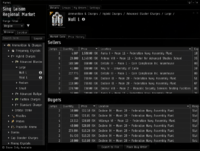Gameplay of Eve Online
Eve Online is a player-driven, persistent-world massively multiplayer online role-playing game (MMORPG) set in a science fiction space setting, developed and published by CCP Games. Characters pilot customizable ships through a galaxy of 7,800 star systems.[2][3] Most star systems are connected to one or more other star systems by means of stargates. The star systems can contain moons, planets, stations, wormholes, asteroid belts and complexes.
| Eve Online | |
|---|---|
 | |
| Developer(s) | CCP Games |
| Publisher(s) | CCP Games |
| Producer(s) | Andie Nordgren |
| Engine | Trinity, Ambulation[1] |
| Platform(s) | Microsoft Windows OS X (via Cider) Linux (via Wine) |
| Release | |
| Genre(s) | Space simulation, massively multiplayer online role-playing game |
| Mode(s) | Multiplayer |
Players of Eve Online can participate in a number of in-game professions and activities, including mining, piracy, manufacturing, trading, exploration, and combat (both player versus environment and player versus player). The character advancement system is based upon passively training skills in real time, even while not logged into the game.[4][5] The game's open-ended sandbox-like design allows players to set their own goals without the need to follow pre-defined missions.[6]
The game's developer CCP Games continuously adds expansions free of charge that change game mechanics and add features.[7] Since the game's release in 2003 the expansions have added gameplay elements such as more ship classes and advanced missions for players to master.
Gameplay
Eve Online runs on a supercomputing cluster known as "Tranquility".[8] Several smaller clusters are used for public and in-house testing including the public test servers "Singularity" and "Multiplicity". The servers require a daily downtime for maintenance and updates. Tranquility's downtime (DT) is scheduled between 11:00 and 11:30 GMT.[9]
Universe
The playing environment in Eve Online consists of about 7,500 star systems called New Eden, almost all of which can be visited by the player. Each system is connected to other systems by one or more static stargates, and in this way neighboring systems are organized into constellations and constellations are in turn organized into 64 regions. The central regions make up most of the so-called high-security ("high-sec") space with some low-security ("low-sec") systems in between. Surrounding these are regions with no security, or 0.0 ("nullsec" or "zero-zero").[10] Approximately 2,500 of these systems are known as J-Space or 'Wormhole Space.' Systems in J-Space lack stargates or other starship infrastructure, and are only connected to other systems via wormholes. Wormholes appear frequently but have a limited lifespan, so connections between these systems, and to New Eden, are unpredictable. The term J-Space comes from the fact that all (except one in particular which has the system name: Thera) has a J as a starting letter then random numbers in its system name.
In some systems a player might be alone, while in others up to thousands of players might gather, e.g. for a fleet battle or to use a trading hub. Different systems contain different types of celestial objects, making them more or less suitable for different kinds of operations. In a typical system the player will find asteroid fields, ruined wreckage, pirate hideouts, stations and moons. Players can also directly harvest resources from planets and moons and use them for producing many sought-after goods.
Advancement
Eve Online is different from MMOGs such as World of Warcraft, Guild Wars, and EverQuest II because the player characters do not gain experience points through actions or by completing tasks. Instead, the player learns skills by training a specific skill over time, a passive process that occurs in real world time so that the learning process will continue even if the player is not logged in. Skills have 5 levels, and each level increases geometrically while skill bonuses per level are linear. This means that gaining competency in a skill requires much less time then getting it to level 5 – a player can easily become competent in many skills but becoming specialized in a skill requires a longer time investment.[5]
Another side-effect of this is that an unusual number of Eve players have two or more accounts since specializing into more than a few areas is impossible within the timeframe of a few years without the use of skill injectors, and skills needed for different professions rarely overlap. Not only that, but many play-styles greatly benefit from the presence of multiple ships; it is not uncommon to see players with secondary accounts for scouting, multiple mining characters, or specifically for trading and manufacturing.
Economy

There is a single currency unit in Eve Online, the InterStellar Kredit (ISK).[6][11][12] Players can barter between themselves for items, use the in-game market system for ISK-based transactions, place and accept contracts between players for assets and services or use a Loyalty Points store.[13]
A large proportion of the in-game economy is player driven; non-player character (NPC) merchants supply some basic blueprints, items and trade goods. Players, through the use of blueprints and in-game skills, can gain the ability to build items ranging from basic ammunition to cutting-edge capital ship hulls and space stations, and manufacture them for personal use or for sale. Pricing and availability of goods varies from region to region within the Eve universe. These aspects contribute to an economic environment influenced by factors like scarcity of resources, specialization of labor and supply/demand dynamics.[14] The economy is closely tied with the (also player driven) political aspect of the game. Player corporations (the Eve equivalent of guilds) rise and fall as they struggle for market dominance as well as territorial control.
From a technical point of view, the economy in Eve is known as an open economy, that is there is no fixed amount of money or materials in the universe. CCP did attempt to implement a closed economy (that is an economy where there is a fixed amount of currency and therefore materials) early on in the game's existence; however, it proved too difficult to balance the effects of new players entering the game with the capabilities of older players able to earn more ISK or obtain more materials. The current open economy is automatically balanced by introducing extra materials in underpopulated areas to encourage an even spread of players.[15]
Eve's End User Licence Agreement forbids the exchange of ISK for real currency (a practice referred to as real money trading or RMT); however, Game Time Codes (GTC), ie. game subscription passes, bought from CCP with real-world currency, can be converted into in-game Pilot License Extensions (PLEX), which are items that can be traded for in-game currency. The purpose of PLEXes is to mitigate the effects of RMT.[16] Similarly, selling and buying characters (but not accounts) for in-game currency is allowed, but only through the official secure exchange known as the Character Bazaar.[17]
On 27 June 2007 CCP announced that an economist had been employed[18] to assist in the development of the economic side of the game. Dr. Eyjólfur Guðmundsson is responsible for compiling quarterly economic reports for the community and providing ongoing analysis of the economic facets of Eve, along with coordinating research with other interested parties.[19][20] Information from Dr. Guðmundsson's reports has been used to make some development decisions regarding the economy. For example, in his second dev blog post[21] he observed that availability of shuttles for a fixed price from NPC merchants, which could then be recycled into tritanium (a sellable mineral), placed an artificial cap on the price of tritanium, indirectly impacting the price of every good manufactured using tritanium (which is almost all of them). This eventually led to a decision to remove NPC sell orders for shuttles.[22]
Combat
Combat in EVE requires tactical decision-making while giving your ship various commands. Action happens on a slower scale than other faster-paced space combat games such as Elite: Dangerous as movement in EVE resembles a three-dimensional maritime simulation more than it does a traditional space flight simulator. Aiming weapons and fine maneuvering are not present, EVE combat is about battlefield positioning, electronic warfare, proper intelligence, and knowing and exploiting ship weaknesses.
Combat usually takes place at large scales, at tens or hundreds of kilometers. Ships are capable of warping to very distant objects or to objects in the immediate vicinity as long as there is something nearby within the minimum warp distance. Because of this, combat usually requires a way to disrupt players from warping otherwise they would simply leave. This makes combat usually take place close to celestial objects rather than in the middle of empty space, but the distance to and location of celestial objects in a solar system or in a constellation can greatly change how a fight turns out.
The way EVE is balanced allows ships of all sizes to be useful in combat. Large ships such as battleships are typically outfitted with large weapons which lack the turning or missile speed required to effectively damage smaller or faster ships, but do more damage to larger targets.[23] Small ships have the advantage of much greater speed and agility, yet have roughly equal electronic warfare capability, are much cheaper, and can be just as deadly in small groups. This means that player organization and inexpensive ships can be just as powerful, if not more so, than large, expensive or solo ships.
The open player versus player combat system, and the tendency for ships to drop some of their cargo and equipment when destroyed, provides incentive for player piracy. Pirates risk being branded criminals by CONCORD, the NPC law enforcement agency. Such outcasts become open targets to all other players, as well as CONCORD in high-security systems, which makes traveling around in those areas somewhat difficult.
Death
In the event that a player's ship is destroyed, a wreck is left behind. Any cargo-hold contents, ship modules, drones and ammunition that were not destroyed in the explosion can be recovered by any player, and additional components from the structure of the ship can be retrieved by a player with the correct "salvaging" modules and skills.
When a ship is destroyed, the player is ejected in a pod. This pod may be destroyed as well if another player chooses to open fire on it. This player death is known as "pod killing" or "podding". In this case, the "podded" player character will die and be revived as a clone at the player's chosen cloning facility. Non-player characters will rarely attack a pod. Any implants installed in a player are irrevocably lost when he or she is pod-killed.[5]
Expanding the cloning system further, jump clones allow advanced players to mitigate risking their cybernetic implants or to quickly move around New Eden by using the Infomorph Psychology skill to jump into a cloned body in another station, without requiring their existing body to die to achieve this. The original body (complete with its cybernetic implants) remains stored in the original station and may be returned to via another clone jump (after a 24-hour waiting period).[24] The waiting period will not be active if the clone jump is activated where the clone that the player is jumping into is in the same station.
References
- "Technology - CCP Games". CCP Games. Archived from the original on 5 September 2015. Retrieved 29 October 2014.
- Drain, Brian (31 March 2013). "EVE Evolved: EVE's Odyssey expansion could be incredible". Massively. Archived from the original on 28 January 2015. Retrieved 15 December 2014.
- CCP Games. "Patch Notes For Rhea". eveonline.com. Retrieved 14 December 2014.
- "How does skill training work?". Eve Online Support. Retrieved October 28, 2007.
- CCP Games. "Eve Online Player Guide, Chapter 6, Skills Guide". eve-online.com. CCP Games. Archived from the original on 2008-02-12. Retrieved 2008-02-24.
- CCP Games. "Eve Online Player Guide, Chapter 1, About EVE Online". eve-online.com. CCP Games. Archived from the original on 2008-05-22. Retrieved 2008-08-01.
- CCP Games. "Eve Online Features". eve-online.com. CCP Games. Archived from the original on 8 January 2008. Retrieved 2008-01-14.
- CCP Games (2006-09-14). "Eve Online launches the most powerful supercomputer in gaming history". eve-online.com. CCP Games. Archived from the original on 21 November 2007. Retrieved 2008-01-15.
- CCP Games. "Eve Online Knowledge Base: Daily Downtime". eve-online.com. CCP Games. Archived from the original on 2008-01-26. Retrieved 2008-01-15.
- "Eve Online Support: Security Zones & Security Status". eve-online.com. CCP Games. 17 October 2007. Archived from the original on 30 September 2007. Retrieved 2007-10-17.
- CCP kieron. "Eve Online forum topic "Why isn't it ISC instead of ISK(eve easter eggs)"". eve-online.com. CCP Games. Retrieved 2008-08-01.
- CCP Wrangler. "Eve Online forum topic "EVE Fanfest 2007!"". eve-online.com. CCP Games. Retrieved 2008-08-01.
- CCP Games. "Eve Online Version 33752 (Revelations II) Patchnotes". eve-online.com. CCP Games. Archived from the original on 2008-04-22. Retrieved 2008-01-15.
- CCP Redundancy (2006-08-14). "Dev blog "A Deal is a Deal"". eve-online.com. CCP Games. Archived from the original on November 21, 2007. Retrieved 2008-01-15.
- Lehdonvirta, Vili (2006-10-02). "Virtual Economy Research Network: Interview with Hilmar Pétursson and Magnús Bergsson". virtual-economy.org. Archived from the original on 2008-01-31. Retrieved 2008-01-15.
- GM Grimmi (11 August 2009). "The way of the PLEX". EVE Online Dev Blog. Archived from the original on 29 April 2011. Retrieved 29 April 2010.
- CCP Zymurgist (28 June 2009). "Character Bazaar Rules and Resources Thread". EVE forums. Retrieved 29 April 2010.
- "Eve Online Appoints In-World Economist". CCP Games. June 28, 2007. Archived from the original on 30 June 2007. Retrieved June 28, 2007.
- CCP Dr.EyjoG (2007-06-27). "Dev blog "Move Over, Greenspan"". eve-online.com. CCP Games. Archived from the original on December 24, 2007. Retrieved 2008-01-15.
- Darren Waters (2008-02-21). "Virtual and real blur in Eve Online". news.bbc.co.uk. BBC News. Retrieved 2008-02-23.
- Eyjo Guðmundsson. "Econ Dev Blog no. 2 - Production of space ships". EVE Dev Blog. Archived from the original on 29 April 2011. Retrieved 29 April 2010.
- Eyjo Guðmundsson (17 April 2008). "No NPC sell orders for shuttles and trit prices". EVE Dev Blog. Archived from the original on 29 April 2011. Retrieved 29 April 2010.
- CCP Games. "Eve Online Player Guide: Tracking". eve-online.com. CCP Games. Archived from the original on 2007-12-23. Retrieved 2008-01-15.
- CCP Games. "Red Moon Rising Features: Project Rebirth". eve-online.com. CCP Games. Retrieved 2014-12-12.
